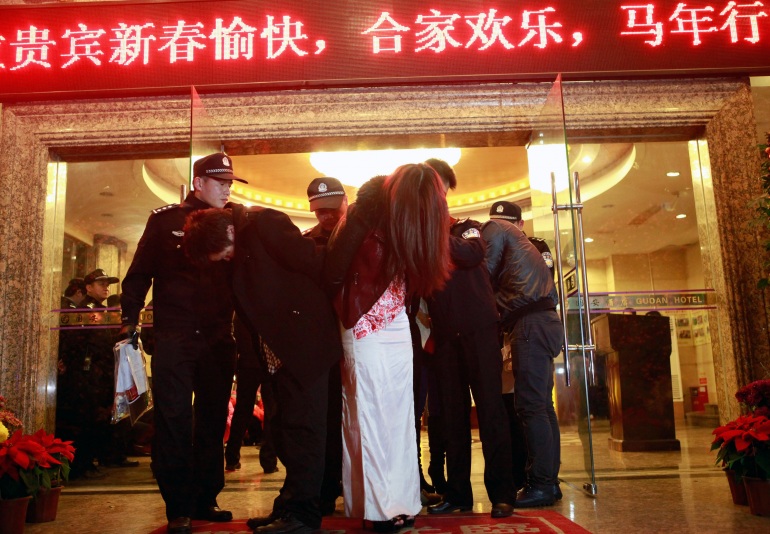Closing the door on sex and the city

Police officers escort suspected prostitutes and their customers out of a hotel during a campaign to crack down on prostitution in Dongguan city, south Chinas Guangdong province, 9 February 2014. AAP
Dongguan, a gritty manufacturing city at the heart of China’s industrial heartland, Guangdong province, has unexpectedly become the centre of media attention this week thanks to a 24-minute undercover report of the city’s bustling prostitution industry by state-owned broadcaster, CCTV.
CCTV’s moral crusade against the world’s oldest profession has sparked lively debate in China. Many people have even called for the decriminalisation of prostitution in China, which has grown rapidly in sync with the country’s booming economy.
Dubbed the ‘sex capital of China’, the city has the third biggest number of five star hotels after Beijing and Shanghai. After the airing of the CCTV report, the embarrassed local government – which has until now turned a blind-eye to the highly visible sex trade – announced a major crackdown.
Police have rounded up thousands of sex workers, pimps and customers, while a local provincial party boss has ordered a three-month long anti-vice campaign to clean up Guangdong province. Apart from providing endless hours of conversational fodders for Chinese citizens, the crackdown also has more serious consequences for the country’s strained economy.
Quan Qingyou, a noted macro-economist who is the head of Minsheng Securities, one of China’s largest brokerage firms, says the crackdown will have an impact on consumer spending and investment and could be reflected in the country’s first quarter GDP data.
He says the size of the sex industry is huge in China and is intimately interwoven into the fabrics of the broader economy such the hotel, restaurant, cosmetic, tourism and transport industries. The sex industry accounts for nearly 10 per cent of local GDP, or 50 billion Yuan, and Qingyou estimates it could be as big as one trillion Yuan or $180 billion in China overall.
To put that in perspective, the two-way merchandise trade between Australia and China is $130 billion. Alternatively, it is about five times larger than the Kenyan economy, one of the best performers in Africa.
“Statistics related to the sex industry are often hidden data and they won’t show up in the official record,” he said in research notes to clients.
“However, they will be reflected through local investment, consumption and tax revenue data and the crackdown on sex trade will have large impact on these economic indices and also result in a higher unemployment rate,” he said.
It will be difficult to estimate its overall impact on China’s GDP. It will depend on the intensity and duration of the crackdown. Even at the most conservative estimate, the crackdown will trim 10 per cent off the country’s sex-related GDP and that is 100 billion Yuan, or $18 billion.
Looking at the big picture, Beijing’s crackdown on prostitution and corruption will have as similar an effect as tightening fiscal policy, which will put the country’s already strained economic growth momentum under further pressure. And it will have global ramifications too.
For example, the Boston Consulting Group, a strategy consulting company, has already lowered the global growth forecast for the luxury goods industry and share prices for big luxury brands like LVMH have been impacted as well.
In China, overall consumption growth has slowed noticeably since Beijing announced the crackdown on corruption in December 2012.
In the first quarter of 2013, domestic consumption growth declined to 12.6 per cent, compared to 15.2 per cent in the final quarter of 2012. The impact on thr hospitality industry was even more dramatic, with the restaurant spending growth rate nearly halving from 15.1 per cent to 8.72 per cent. An estimated 100 billion Yuan was heaved off China’s GDP.
Some analysts have underestimated Beijing’s resolve to crack down on rampant corruption. The latest anti-vice campaign is further evidence that the battle against graft is only heating up.
These policies will have a noticeable short-term impact on consumption at a time when the economy is already under considerable pressure. However, the long-term benefits – such as reining in China’s runaway corruption problem – will be more significant.
Follow Peter Cai on Twitter: @peteryuancai
Subscribe to the China Spectator newsletter: http://bit.ly/ChinaSpec













